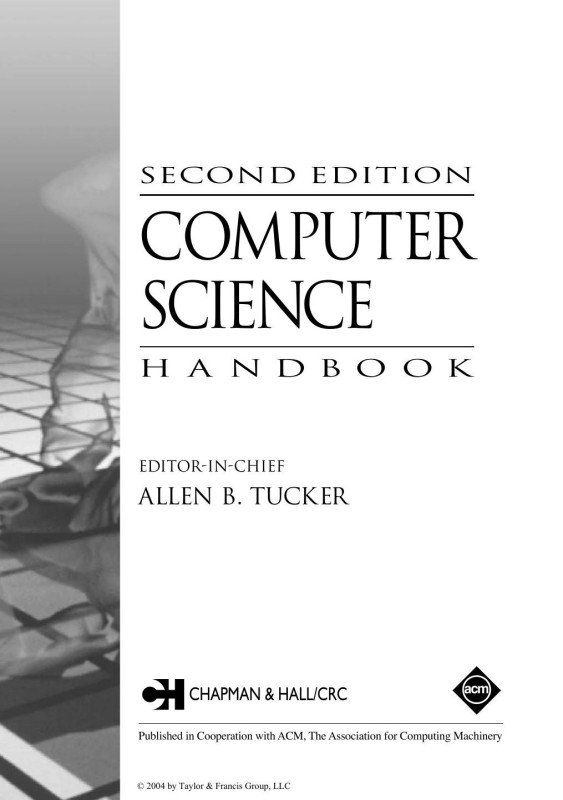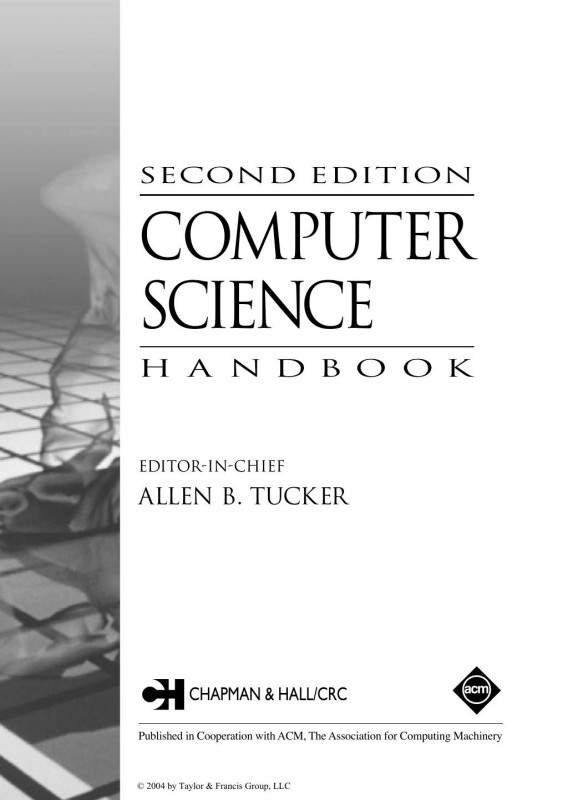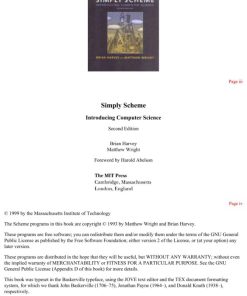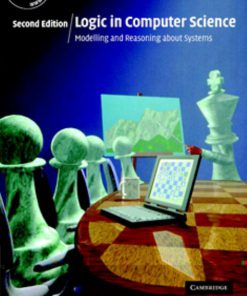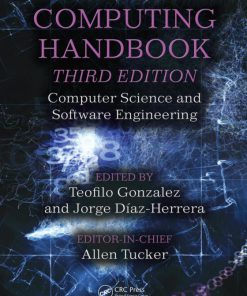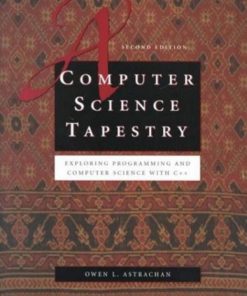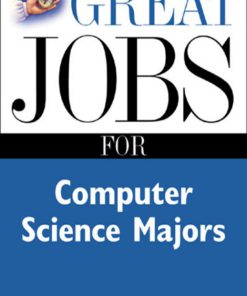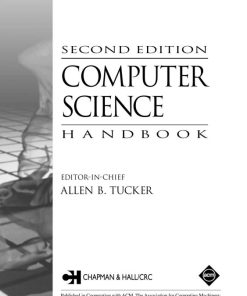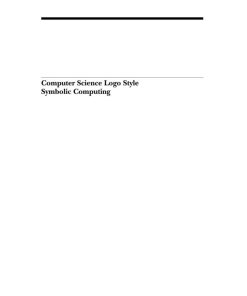Computer Science Handbook 2nd Edition by Allen Tucker ISBN 158488360X 9781584883609
$50.00 Original price was: $50.00.$25.00Current price is: $25.00.
Authors:Computer science handbook-Chapman; Hall CRC (2004) (1) , Author sort:handbook-Chapman, Computer science & CRC, Hall , Published:Published:Jan 2007
Computer Science Handbook 2nd Edition by Allen B. Tucker – Ebook PDF Instant Download/Delivery. 158488360X, 978-1584883609
Full download Computer Science Handbook 2nd Edition after payment
Product details:
ISBN 10: 158488360X
ISBN 13: 978-1584883609
Author: Allen B. Tucker
Computer Science Handbook 2nd Edition:
When you think about how far and fast computer science has progressed in recent years, it’s not hard to conclude that a seven-year old handbook may fall a little short of the kind of reference today’s computer scientists, software engineers, and IT professionals need.
With a broadened scope, more emphasis on applied computing, and more than 70 chapters either new or significantly revised, the Computer Science Handbook, Second Edition is exactly the kind of reference you need. This rich collection of theory and practice fully characterizes the current state of the field and conveys the modern spirit, accomplishments, and direction of computer science.
Highlights of the Second Edition:
- Coverage that reaches across all 11 subject areas of the discipline as defined in Computing Curricula 2001, now the standard taxonomy
- More than 70 chapters revised or replaced
- Emphasis on a more practical/applied approach to IT topics such as information management, net-centric computing, and human computer interaction
- More than 150 contributing authors–all recognized experts in their respective specialties
- New chapters on:
cryptography computational chemistry computational astrophysics human-centered software development
cognitive modeling transaction processing data compression
scripting languages event-driven programming
software architecture
Computer Science Handbook 2nd Edition Table of contents:
- Chapter 1: Computer Science: The Discipline and its Impact
- Chapter 2: Ethical Issues for Computer Scientists
- Chapter 3: Basic Techniques for Design and Analysis of Algorithms
- Chapter 4: Data Structures
- Chapter 5: Complexity Theory
- Chapter 6: Formal Models and Computability
- Chapter 7: Graph and Network Algorithms
- Chapter 8: Algebraic Algorithms
- Chapter 9: Cryptography
- Chapter 10: Parallel Algorithms
- Chapter 11: Computational Geometry
- Chapter 12: Randomized Algorithms
- Chapter 13: Pattern Matching and Text Compression Algorithms
- Chapter 14: Genetic Algorithms
- Chapter 15: Combinatorial Optimization
- Chapter 16: Digital Logic
- Chapter 17: Digital Computer Architecture
- Chapter 18: Memory Systems
- Chapter 19: Buses
- Chapter 20: Input/Output Devices and Interaction Techniques
- Chapter 21: Secondary Storage Systems
- Chapter 22: High-Speed Computer Arithmetic
- Chapter 23: Parallel Architectures
- Chapter 24: Architecture and Networks
- Chapter 25: Fault Tolerance
- Chapter 26: Geometry-Grid Generation
- Chapter 27: Scientific Visualization
- Chapter 28: Computational Structural Mechanics
- Chapter 29: Computational Electromagnetics
- Chapter 30: Computational Fluid Dynamics
- Chapter 31: Computational Ocean Modeling
- Chapter 32: Computational Chemistry
- Chapter 33: Computational Astrophysics
- Chapter 34: Computational Biology
- Chapter 35: Overview of Three-Dimensional Computer Graphics
- Chapter 36: Geometric Primitives
- Chapter 37: Advanced Geometric Modeling
- Chapter 38: Mainstream Rendering Techniques
- Chapter 39: Sampling, Reconstruction, and Antialiasing
- Chapter 40: Computer Animation
- Chapter 41: Volume Visualization
- Chapter 42: Virtual Reality
- Chapter 43: Computer Vision
- Chapter 44: The Organizational Contexts of Development and Use
- Chapter 45: Usability Engineering
- Chapter 46: Task Analysis and the Design of Functionality
- Chapter 47: Human-Centered System Development
- Chapter 48: Graphical User Interface Programming
- Chapter 49: Multimedia
- Chapter 50: Computer-Supported Collaborative Work
- Chapter 51: Applying International Usability Standards
- Chapter 52: Data Models
- Chapter 53: Tuning Database Design for High Performance
- Chapter 54: Access Methods
- Chapter 55: Query Optimization
- Chapter 56: Concurrency Control and Recovery
- Chapter 57: Transaction Processing
- Chapter 58: Distributed and Parallel Database Systems
- Chapter 59: Multimedia Databases: Analysis, Modeling, Querying, and Indexing
- Chapter 60: Database Security and Privacy
- Chapter 61: Logic-Based Reasoning for Intelligent Systems
- Chapter 62: Qualitative Reasoning
- Chapter 63: Search
- Chapter 64: Understanding Spoken Language
- Chapter 65: Decision Trees and Instance-Based Classifiers
- Chapter 66: Neural Networks
- Chapter 67: Planning and Scheduling
- Chapter 68: Explanation-Based Learning
- Chapter 69: Cognitive Modeling
- Chapter 70: Graphical Models for Probabilistic and Causal Reasoning
- Chapter 71: Robotics
- Chapter 72: Network Organization and Topologies
- Chapter 73: Routing Protocols
- Chapter 74: Network and Internet Security
- Chapter 75: Information Retrieval and Data Mining
- Chapter 76: Data Compression
- Chapter 77: Security and Privacy
- Chapter 78: Malicious Software and Hacking
- Chapter 79: Authentication, Access Control, and Intrusion Detection
- Chapter 80: What Is an Operating System?
- Chapter 81: Thread Management for Shared-Memory Multiprocessors
- Chapter 82: Process and Device Scheduling
- Chapter 83: Real-Time and Embedded Systems
- Chapter 84: Process Synchronization and Interprocess Communication
- Chapter 85: Virtual Memory
- Chapter 86: Secondary Storage and File Systems
- Chapter 87: Overview of Distributed Operating Systems
- Chapter 88: Distributed and Multiprocessor Scheduling
- Chapter 89: Distributed File Systems and Distributed Memory
- Chapter 90: Imperative Language Paradigm
- Chapter 91: The Object-Oriented Language Paradigm
- Chapter 92: Functional Programming Languages
- Chapter 93: Logic Programming and Constraint Logic Programming
- Chapter 94: Scripting Languages
- Chapter 95: Event-Driven Programming
- Chapter 96: Concurrent/Distributed Computing Paradigm
- Chapter 97: Type Systems
- Chapter 98: Programming Language Semantics
- Chapter 99: Compilers and Interpreters
- Chapter 100: Runtime Environments and Memory Management
- Chapter 101: Software Qualities and Principles
- Chapter 102: Software Process Models
- Chapter 103: Traditional Software Design
- Chapter 104: Object-Oriented Software Design
- Chapter 105: Software Testing
- Chapter 106: Formal Methods
- Chapter 107: Verification and Validation
- Chapter 108: Development Strategies and Project Management
- Chapter 109: Software Architecture
- Chapter 110: Specialized System Development
People also search for Computer Science Handbook 2nd Edition:
handbook computer science and it
commerce and computer science handbook
actuarial studies computer science handbook
handbook of computer science & it arihant pdf download
the computer science and engineering handbook
You may also like…
eBook PDF
Great Jobs for Computer Science Majors 2nd Edition by Jan Goldberg ISBN 0071390391 9780071390392

